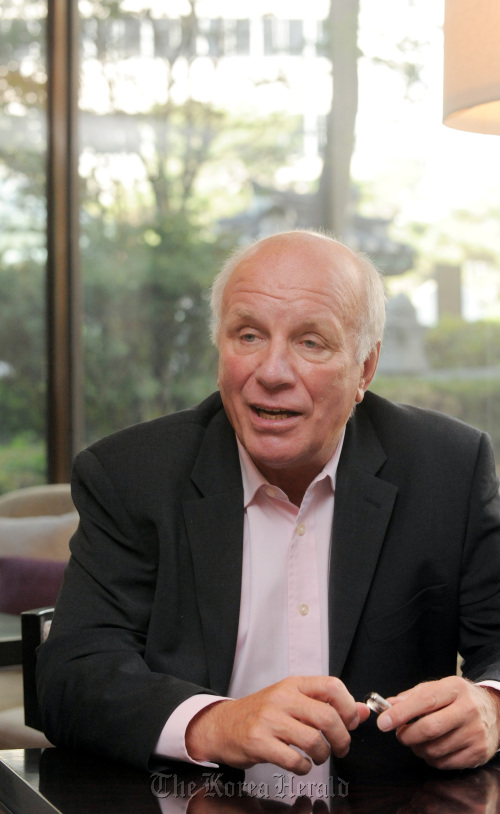
Former BBC director-general Greg Dyke in Seoul, Tuesday (Ahn Hoon/The Korea Herald)
It maybe inevitable that public broadcaster MBC becomes a commercial channel due to stiff competition for advertising from new channels run by major newspapers which begin operation next month, former BBC chief Greg Dyke said Tuesday.
Dyke, who was director-general of the BBC from 2000 to 2004, is most famous for standing up against Tony Blair’s Labor government after a 2003 BBC news report on how the government had “sexed up” the military capabilities of Iraq to justify going to war. The intelligence source, David Kelly, was found dead after his identity was revealed.
Now serving as chairman of the British Film Institute, Dyke is in Seoul for a few days to speak at a forum on the future of public broadcasters, organized by MBC Foundation.
Among the public broadcasters, MBC faces the greatest challenge in gathering revenues because it is mostly funded by advertising, whereas KBS and EBS are funded by license fees paid by viewers.
“The question here is, does MBC, over time, stop being a public broadcaster and become instead a commercial channel? As a person who’s seen a similar experience in the U.K., it will be better for MBC to sort that out earlier than later,” Dyke told The Korea Herald.
“Among three broadcasters in the U.K. ― BBC, iTV and Channel 4 ― iTV and Channel 4 were funded by advertising and BBC, by license fee. iTV had to be a much more commercial channel because of new competition.”
During his tenure at the BBC, Dyke introduced Freeview, a terrestrial digital transmission platform with six additional BBC channels.
Dyke, however, did not paint a rosy picture for the future of the new channels to be run by The Chosun Ilbo, JoongAng Ilbo, Maeil Business and Dong-a Ilbo.
“Over time, it is unlikely that the total advertising market will grow,” he said.
The 64-year-old media expert said the most important thing for public broadcasters is to show that their news is fair, impartial and accurate.
Taking pride in keeping the BBC impartial, Dyke said the British government made a “terrible mistake” when they “fired” him in 2004.
“We ran the story in which someone from the intelligence services led the government to sex up the case for war. I lost the job over it but in terms of history, we were right,” he said.
Dyke also established content provider Pearson Television, currently known as Frementle, which came up with the formats for popular TV shows such as “X-Factor,” “Got Talent” and “American Idol.”
Asked why the U.K. is globally strong in exporting programming formats, Dyke could not put his finger on the reason but said “some countries are good at some things.”
By Kim Yoon-mi (yoonmi@heraldcorp.com)



![[Herald Interview] 'Amid aging population, Korea to invite more young professionals from overseas'](http://res.heraldm.com/phpwas/restmb_idxmake.php?idx=645&simg=/content/image/2024/04/24/20240424050844_0.jpg&u=20240424200058)


